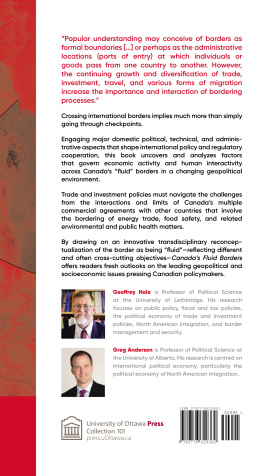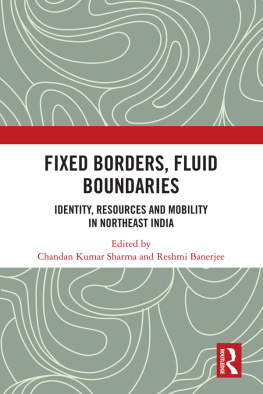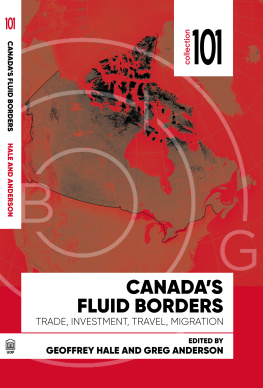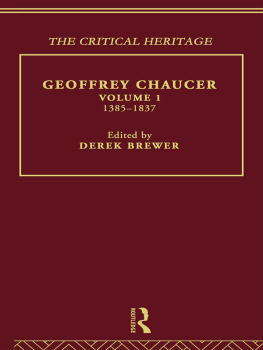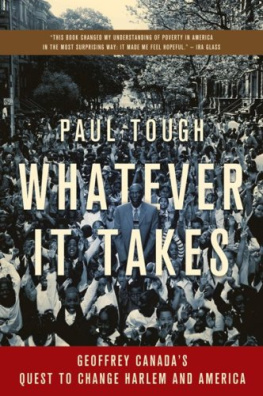Geoffrey Hale - Canadas Fluid Borders
Here you can read online Geoffrey Hale - Canadas Fluid Borders full text of the book (entire story) in english for free. Download pdf and epub, get meaning, cover and reviews about this ebook. year: 2020, publisher: University of Ottawa Press, genre: Politics. Description of the work, (preface) as well as reviews are available. Best literature library LitArk.com created for fans of good reading and offers a wide selection of genres:
Romance novel
Science fiction
Adventure
Detective
Science
History
Home and family
Prose
Art
Politics
Computer
Non-fiction
Religion
Business
Children
Humor
Choose a favorite category and find really read worthwhile books. Enjoy immersion in the world of imagination, feel the emotions of the characters or learn something new for yourself, make an fascinating discovery.
- Book:Canadas Fluid Borders
- Author:
- Publisher:University of Ottawa Press
- Genre:
- Year:2020
- Rating:3 / 5
- Favourites:Add to favourites
- Your mark:
- 60
- 1
- 2
- 3
- 4
- 5
Canadas Fluid Borders: summary, description and annotation
We offer to read an annotation, description, summary or preface (depends on what the author of the book "Canadas Fluid Borders" wrote himself). If you haven't found the necessary information about the book — write in the comments, we will try to find it.
Canadas Fluid Borders — read online for free the complete book (whole text) full work
Below is the text of the book, divided by pages. System saving the place of the last page read, allows you to conveniently read the book "Canadas Fluid Borders" online for free, without having to search again every time where you left off. Put a bookmark, and you can go to the page where you finished reading at any time.
Font size:
Interval:
Bookmark:
- An Overview of Market and Human Movements
by Geoffrey Hale
- An Overview of Market and Human Movements
- Managing Challenges, Complexity, and Change
by Greg Anderson and Geoffrey Hale
- Managing Challenges, Complexity, and Change


The University of Ottawa Press ( UOP ) is proud to be the oldest of the francophone university presses in Canada as well as the oldest bilingual university publisher in North America. Since 1936, UOP has been enriching intellectual and cultural discourse by producing peer-reviewed and award-winning books in the humanities and social sciences, in French and in English.
Library and Archives Canada Cataloguing in Publication
Title: Canadas Fluid Borders: Trade, Investment, Travel, Migration / edited by Geoffrey Hale and Greg Anderson
Names: Hale, Geoffrey, 1955-editor. | Anderson, Greg, 1969-editor.
Series: 101-Borders
Description: Series statement: Collection 101 | Includes bibliographical references.
Identifiers: Canadiana (print) 20200271911 | Canadiana (ebook) 20200271938 | ISBN 9780776629407 (hardcover) | ISBN 9780776629360 (softcover) | ISBN 9780776629377 ( PDF ) | ISBN 9780776629384 ( EPUB ) | ISBN 9780776629391 (Kindle)
Subjects: LCSH : CanadaCommercial policy. | LCSH : CanadaCommerce.
Classification: LCC HF1479. C35 2020 | ddc 382/.30971dc23
Legal Deposit: First Quarter 2021 Library and Archives Canada Printed in Canada Production Team
Cover Image Map of Canada by FrankRamspott | University of Ottawa Press 2021 All rights reserved. No part of this publication may be reproduced or transmitted in any form or by any means, or stored in a database and retrieval system, without the prior permission. In the case of photocopying or any other reprographic copying, please secure licenses from: Access Copyright www.accesscopyright.ca 1-800-893-5777 For foreign rights and permissions: |
The University of Ottawa Press gratefully acknowledges the support extended to its publishing list by the Government of Canada, the Canada Council for the Arts, the Ontario Arts Council, the Social Sciences and Humanities Research Council and the Canadian Federation for the Humanities and Social Sciences through the Awards to Scholarly Publications Program, and by the University of Ottawa.

An Overview of Market and Human Movements
by Geoffrey Hale
Managing Challenges, Complexity, and Change
by Greg Anderson and Geoffrey Hale
Tables
Figures
Appendices
This volume was prepared as part of the market flows and human movements component of the Borders in Globalization projecta multidisciplinary research project coordinated by Professor Emmanuel Brunet-Jailly of the University of Victoria and Professor Victor Konrad of Carleton University. The editors wish to express their appreciation to the project coordinators for their helpful insights at various stages of the project, and to project administrator Nicole Bates-Eamer, whose combination of thoroughness, efficiency, tact, and perseverance we have rarely seen equalled, and never excelled, in many years of collaborative research activity. We also wish to acknowledge the indispensable funding assistance of the Social Sciences and Humanities Research Council of Canada. We are grateful for the timely and efficient editorial assistance of Samson Epp in assembling the manuscript, and of Emmanuel Hogg, Caroline Boudreau, Maryse Cloutier, and their colleagues at the University of Ottawa Press in shepherding it through the publication process.
The revised manuscript was submitted for publication two weeks after the imposition of the most extensive border restrictions in Canadian history in response to the global coronavirus pandemic of 2020but with mutually agreed provisions for the continuation of cross-border trade and transit of other vital occupations, not least the 1,600 Canadians commuting to work in medical facilities in southeastern Michigan, with many more in other Canada- US border communities. This kind of pragmatic adaptation to unexpected (if not entirely unforeseen) circumstancesand the realities of complex interdependence that shape Canadas bordering processeshelp to illustrate the continuing fluidity of Canadas multiple borders, even at times of exceptional freeze-up.
Borders in Globalization, a multi-disciplinary and international research program, funded through a sshrc Partnership Grant and the European Unions Jean Monnet Program with colleagues across Canada and in 15 different countries, collected data on borders from 2012 to 2020. Our core research focus was to challenge the well-established conception that borders are primarily understood as sovereign territorial boundaries that emerge out of international treaties. The research program thus addressed fundamental how, why, and what questions about borders, a very important contribution to knowledge in a globalizing world when movement is increasingly scrutinized everywhere, and not just at the sovereign boundary line of states, and at a time when goods seem to travel more easily than humans. Indeed, the regulation of human flows across borders is fraught and highly contentious, and even today humans die crossing borders in the thousands yearly.
Our team studied border history and culture, mobility and security, environmental sustainability, and governance. As illustrated by this book, and the University of Ottawa Press series on Borders in Globalization, our research program initially approached those questions from the perspective of territories, regions, and states, to collect evidence that there were multiple challenges to the territorial trap assumption.
In this edited collection, Geoffrey Hale and Greg Anderson, with Sandy Moroz, Monica Gattinger, Patricia Dewey Lambert, Meredith Lilly, William Kerr, and Jill Hobbs, document and explore investment, travel, and migration flows taking place between Canada and the United States. The border they discuss is not a Westphalian international boundary line but a complex and multiple system of functionally focused regulations made up of multiple trade and sectoral agreements that do not only include Canada and the US ; their work points to bordering processes mirroring the functional regulatory fluidity of various scales. These form various transnational legal systems organizing the mobility of goods and people. These findings form one element of big s a-territorial suggestion that 21st-century borders of flows and mobility challenge Westphalias international boundary and territorial trap argument.
More generally, we found that more than ever before, states border policies straddled their sovereign boundary lines; that networked policies overlapped many different jurisdictional scales, including but not exclusively that of the sovereign territories of other states. Our second hypothesis, that contemporary borders in globalization were processes that in many instances were fundamentally a-territorial, was also confirmed when we found that bordering processes were not uniquely territorial but, rather, fundamentally linked to movements across the world. We discovered that bordering policies increasingly disregarded the territorial limits of states, sometimes implementing borders thousands of kilometres away from their international boundary line.
Font size:
Interval:
Bookmark:
Similar books «Canadas Fluid Borders»
Look at similar books to Canadas Fluid Borders. We have selected literature similar in name and meaning in the hope of providing readers with more options to find new, interesting, not yet read works.
Discussion, reviews of the book Canadas Fluid Borders and just readers' own opinions. Leave your comments, write what you think about the work, its meaning or the main characters. Specify what exactly you liked and what you didn't like, and why you think so.

